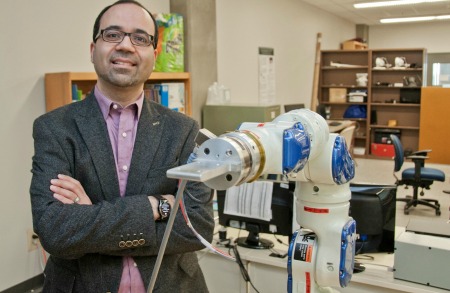
UAlberta engineering professor Mahdi Tavakoli is developing medical robots to make patient care more accessible while making the health-care system more efficient.
(Edmonton) Whether it be helping someone with a disability pick up an egg or fastidiously inserting a series of 20-centimetre needles into a prostate to irradiate cancer, Mahdi Tavakoli has dedicated his robotics lab to the importance of a steady hand.
The breadth of the electrical and computer engineering professor's research interests stems from an interest in finding efficiencies in the rehabilitation process.
"If you make a robot that can assist a therapist or, better yet, learn what the therapist is doing and replicate the same behaviours for the patient, then you can reduce demands on the health system," said Tavakoli.
For instance, Tavakoli's team is developing hand-held robots that therapists can program to reproduce a rehabilitation behaviour for a patient. In the case of a reaching movement, he said the robot can be taught to sense when the patient is slowing down and can support the patient's movement to the target point.
"We're also working on making this a smart system. If the task changes, like pouring juice into a glass, the therapist can show the robot how this is done.
"The robot learns."
Giving kids a robotic helping hand
In collaboration with rehabilitation medicine researcher Kim Adams, Tavakoli is also developing a remote-controlled robot that enables children to pick up objects
"Children with a physical disability can be deprived of exploring the world around them or enjoying simple play, and that can lead to cognitive deficits later," he said. "We are not focused on rehabilitation-although that would be nice-instead we want the child to still do what able-bodied children do."
He added this research will make it possible for a therapist to interact more efficiently with a disabled patient undergoing rehabilitation therapies at the hospital, at home or in a remote area.
Providing precise prostate care
In parallel, the lab is also perfecting a robot designed to improve the efficiency and outcomes of prostate brachytherapy-delivery of radiation sources to cancerous tissue using needles while avoiding damage to healthy organs, vessels or nerves. Precision is everything in this delicate procedure, so Tavakoli has developed a needle-steering apparatus that is accurate within a third of a millimetre.
"These medical robotics technologies will help reduce patient trauma, increase patient recovery and allow for greater access to health care from homes and remote regions of Canada," he said, adding it could save millions of dollars annually in health-care costs.
Tavakoli was recently awarded more than $80,000 by the Canada Foundation for Innovation's John R. Evans Leaders Fund to upgrade his Telerobotic and Biorobotic Systems Lab in pursuit of his research.